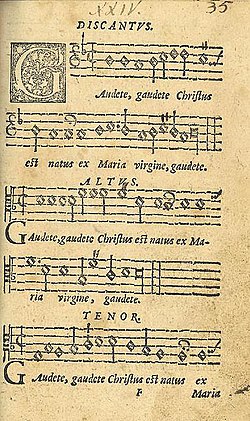Gaudete: Difference between revisions
No edit summary |
No edit summary |
||
| Line 44: | Line 44: | ||
|- |
|- |
||
| Ergo nostra cantio,</br>Psallat iam in lustro;</br>Benedicat Domino:</br>Salus Regi nostro. |
| Ergo nostra cantio,</br>Psallat iam in lustro;</br>Benedicat Domino:</br>Salus Regi nostro. |
||
| Therefore let our song</br>Now resound in purification</br>Let it give praise to the Lord:</br> |
| Therefore let our song</br>Now resound in purification</br>Let it give praise to the Lord:</br>Salvation to our King. |
||
|- |
|- |
||
|} |
|} |
||
Revision as of 23:02, 3 January 2008

"Gaudete" ("Rejoice") is a sacred Christmas carol, composed sometime in the 16th century, most likely in reference to Gaudete Sunday, the third Sunday in Advent. It is celebrated in the Roman Catholic Church falling between December 11 and December 17 inclusive. The song was published in the Piae Cantiones, a collection of Finnish/Swedish sacred songs published in 1582. No music is given for the verses, but the standard tune comes from older liturgical books.
The text, in Latin, is a typical song of praise, probably stemming from the Middle Ages. It follows the standard pattern for the time - a uniform series of four-line stanzas, each preceded by a two-line refrain (in the early English carol this was known as the burden). Carols could be on any subject, but typically they were about the Virgin Mary or the Saints of Christmas.
Recordings
Steeleye Span
The Electric folk group Steeleye Span had a hit in 1974 (No. 11, UK singles chart) with an a cappella recording of the song. This single is one of only three top 50 British hits to be sung in Latin (the others were both recordings of 'Pie Jesu'; firstly by Sarah Brightman and Paul Miles-Kingston in 1986, secondly as a minor hit by the 12-year-old Charlotte Church in 1998 who recorded "Pie Jesu" from Andrew Lloyd Webber's Requiem). In 1975 Mike Oldfield had a top 10 hit with "In Dulci Jubilo" but this Latin song was performed as an instrumental. Gaudete is one of only a handful of a cappella performances to become hit singles. (Another notable example is "Only You" sung by The Flying Pickets). When Gaudete was performed on Top of the Pops, the resident dance troupe walked onto the set in medieval-style robes, holding candles and followed by the members of Steeleye Span. The hit version also appears on compilation albums, such as "Now That's What I Call Xmas" (2006).
Guitarist Bob Johnson visited a church with his father-in-law in Cambridge and heard a folk-carol service. He was attracted by the song and brought it to the attention of the rest of Steeleye Span.
Other
The Boston Camerata, under the direction of Joel Cohen, recorded a version of Gaudete entitled "Gaudete, Gaudete" for the 1991 album A Renaissance Christmas.
In 1997 it was recorded by the classical group Mediaeval Baebes as part of their No. 2 selling classical recording Salva Nos.
Gaudete has been recorded a cappella by Pure Reason Revolution as a Christmas bonus track on their debut EP, Cautionary Tales For The Brave.
In 1999, harpist Kim Robertson offered a lively rendition of the song on her disc The Spiral Gate.
A parody of Gaudete, replacing the original words of the verses by sex-related terms, was recorded by the German Medieval rock band Potentia Animi on their 2004 album Das Erste Gebet.
Chris Squire and a choir recorded a rock version on the 2007 Christmas album Chris Squire's Swiss Choir.
Lyrics
The complete text of the Gaudete, including the refrain:
| Latin | English |
|---|---|
| Gaudete, gaudete! Christus est natus Ex Maria virginæ, gaudete! |
Rejoice, rejoice! Christ is born Of the Virgin Mary, rejoice! |
| Tempus adest gratiæ Hoc quod optabamus, Carmina lætitiæ Devote reddamus. |
It is now the time of grace That we have desired; Let us devoutly return Songs of rejoicing. |
| Deus homo factus est Natura mirante, Mundus renovatus est A Christo regnante. |
God has become man, And nature marvels; The world has been renewed By Christ who is King. |
| Ezechielis porta Clausa pertransitur, Unde lux est orta Salus invenitur. |
The closed gate of Ezechiel Has been passed through; Salvation is found there, Whence the light rises. |
| Ergo nostra cantio, Psallat iam in lustro; Benedicat Domino: Salus Regi nostro. |
Therefore let our song Now resound in purification Let it give praise to the Lord: Salvation to our King. |
Listen
Template:Multi-listen start Template:Multi-listen item Template:Multi-listen end
